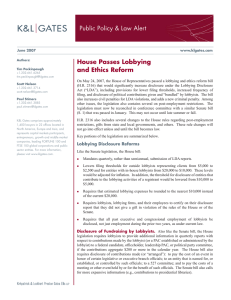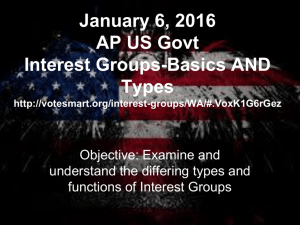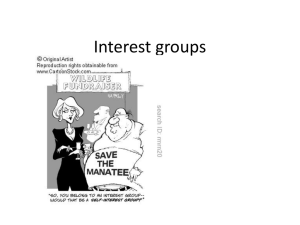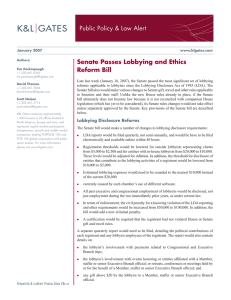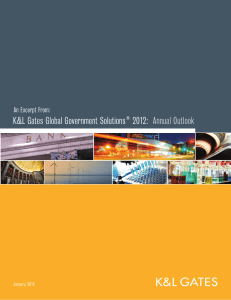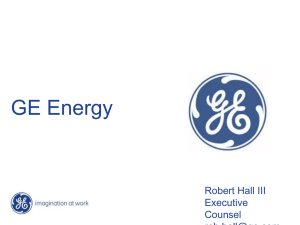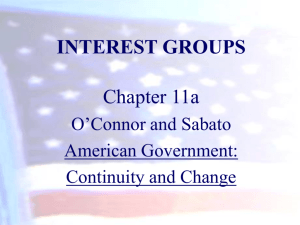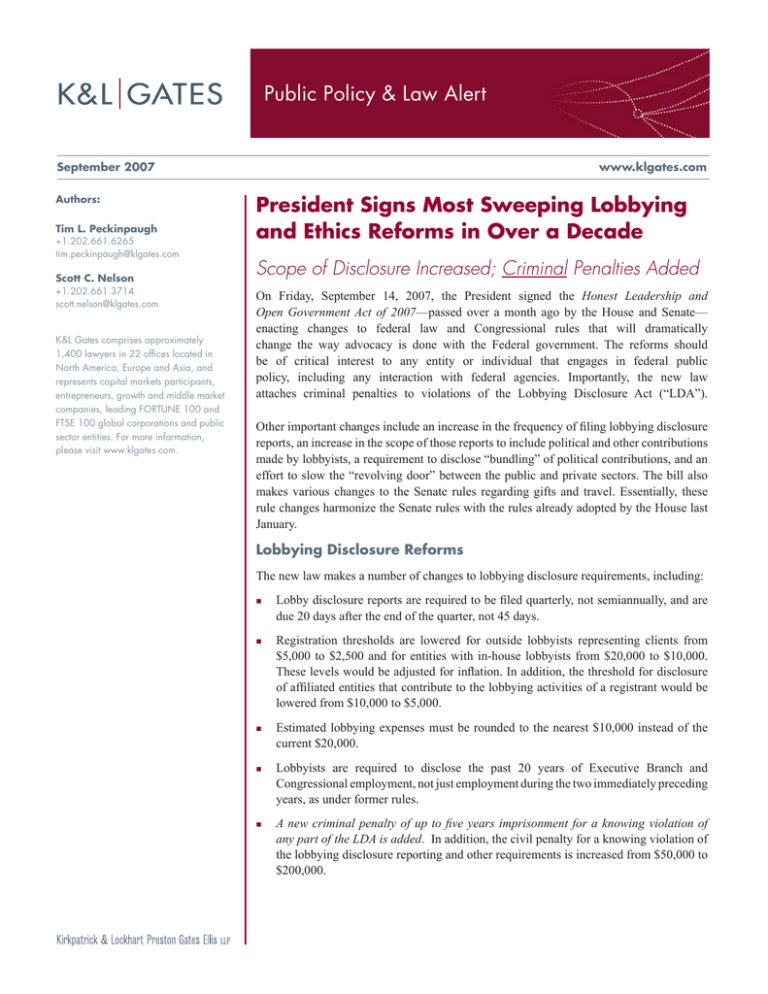
Public Policy & Law Alert
September 2007
Authors:
Tim L. Peckinpaugh
+1.202.661.6265
tim.peckinpaugh@klgates.com
Scott C. Nelson
+1.202.661.3714
scott.nelson@klgates.com
K&L Gates comprises approximately
1,400 lawyers in 22 offices located in
North America, Europe and Asia, and
represents capital markets participants,
entrepreneurs, growth and middle market
companies, leading FORTUNE 100 and
FTSE 100 global corporations and public
sector entities. For more information,
please visit www.klgates.com.
www.klgates.com
President Signs Most Sweeping Lobbying
and Ethics Reforms in Over a Decade
Scope of Disclosure Increased; Criminal Penalties Added
On Friday, September 14, 2007, the President signed the Honest Leadership and
Open Government Act of 2007—passed over a month ago by the House and Senate—
enacting changes to federal law and Congressional rules that will dramatically
change the way advocacy is done with the Federal government. The reforms should
be of critical interest to any entity or individual that engages in federal public
policy, including any interaction with federal agencies. Importantly, the new law
attaches criminal penalties to violations of the Lobbying Disclosure Act (“LDA”).
Other important changes include an increase in the frequency of filing lobbying disclosure
reports, an increase in the scope of those reports to include political and other contributions
made by lobbyists, a requirement to disclose “bundling” of political contributions, and an
effort to slow the “revolving door” between the public and private sectors. The bill also
makes various changes to the Senate rules regarding gifts and travel. Essentially, these
rule changes harmonize the Senate rules with the rules already adopted by the House last
January.
Lobbying Disclosure Reforms
The new law makes a number of changes to lobbying disclosure requirements, including:
Lobby disclosure reports are required to be filed quarterly, not semiannually, and are
due 20 days after the end of the quarter, not 45 days.
Registration thresholds are lowered for outside lobbyists representing clients from
$5,000 to $2,500 and for entities with in-house lobbyists from $20,000 to $10,000.
These levels would be adjusted for inflation. In addition, the threshold for disclosure
of affiliated entities that contribute to the lobbying activities of a registrant would be
lowered from $10,000 to $5,000.
Estimated lobbying expenses must be rounded to the nearest $10,000 instead of the
current $20,000.
Lobbyists are required to disclose the past 20 years of Executive Branch and
Congressional employment, not just employment during the two immediately preceding
years, as under former rules.
A new criminal penalty of up to five years imprisonment for a knowing violation of
any part of the LDA is added. In addition, the civil penalty for a knowing violation of
the lobbying disclosure reporting and other requirements is increased from $50,000 to
$200,000.
Public Policy & Law Alert
A new, separate semiannual report must be filed,
on behalf of each employee listed as a lobbyist
and each registered organization, detailing all the
political contributions made by these individuals
or organizations of $200 or more. The report must
also contain details on:
the lobbyist’s involvement with payments related
to Congressional and Executive Branch trips;
the lobbyist’s involvement with events honoring
a covered Congressional or Executive branch
official, or entities affiliated with those officials;
or retreats, conferences or meetings held by or
for the benefit of a Member, staffer or senior
Executive Branch official; and
the lobbyist’s contributions to Presidential library
foundations and inaugural committees.
This semiannual report also includes a certification
that the filer has read the rules of the House and Senate
and has not provided a gift or travel that would violate
those rules. In addition, the law creates a stand-alone
violation of the LDA for registered lobbyists (and
organizations that employ them) that provide gifts
or travel in violation of the rules, thus subjecting
lobbyists to the LDA’s criminal and civil sanctions.
The disclosure-related changes to the LDA go into
effect on January 1, 2008; thus the semiannual
filing for the period ending December 31, 2007
(due February 14, 2008) will still be subject to the
“old” rules. However, the criminal penalty for any
violation of the LDA and the substantive provision
imposing liability on registered lobbyists for giving
gifts in violation of the House or Senate rules went
into effect at the time of the President’s signing.
Campaign Finance and “Bundling”
Federal election law is amended to require disclosure—
by the receiving campaign committee, leadership PAC,
or political party—of certain contributions “bundled”
by those persons registered to lobby or an employee
listed on a federal lobbying disclosure report.
Specifically, the political committee receiving
contributions is required to list the name, address,
employer, and aggregate amount “bundled” of a
lobbyist that “bundles” more than $15,000 in a
semiannual filing period. A bundled contribution is
one that is forwarded by the bundler to the committee
or received by the committee, but credited to the
bundler.
The effective date of this provision is three months
after FEC regulations promulgated to implement this
new provision become final.
Travel
Like the new House rules, Senate rules generally
ban travel paid for by lobbyists, agents of foreign
principals, and the private entities that employ or
retain them. There are a few exceptions to this. First,
as in the House rules, Members and staff may accept
travel from entities that employ or retain lobbyists
and foreign agents for one-day events (including an
overnight stay). As in the House, a two-night stay
could be preapproved if it is logistically necessary.
Second, 501(c)(3) organizations could sponsor
travel, even if they employ or retain lobbyists or
foreign agents. The House rules do not contain
this exception (although the House includes an
exception for institutions of higher education).
In any case, travel could not be accepted if a registered
lobbyist or foreign agent planned, organized,
requested, or arranged the trip (subject to a de minimis
involvement exception), or if a lobbyist accompanied
the Member or staff on any segment of the trip.
Travel paid for by a permissible private source must
also be preapproved by the Senate ethics committee.
Before accepting transportation or lodging from such
a source, Senators or their staff must obtain a written
certification that:
the trip will not be financed by a registered lobbyist
or foreign agent;
the person offering the transportation or lodging
will not accept, directly or indirectly, funds
from another person that were earmarked for the
travel;
the trip will not be planned, organized, requested
or arranged by a registered lobbyist or foreign
agent; and
September 2007 | 2
Public Policy & Law Alert
registered lobbyists will not participate in or
attend the trip.
These changes take effect the later of 60 days after the
signing or promulgation of regulations by the ethics
committee.
The new law requires Senators to pay a cost
comparable to similar charter travel when traveling
on noncommercial aircraft. Currently, only the
comparable first-class cost is required to be paid.
Gifts
on any items contained in a reported bill as soon as
practicably possible. Conference reports face similar
points of order before proceeding to a vote. A Senator
may also raise a point of order against a conference
report that contains an item with a specific funding
level if no such funding level was provided in either
measure originally committed to the conferees.
“Congressionally directed spending item” is
defined as a provision or report language providing,
authorizing, or recommending a specific amount of
spending authority for an entity or that is targeted to
a specific State, locality, or Congressional district.
A “limited tax benefit” is a revenue provision that
provides a federal tax deduction, credit, exclusion
or preference to a beneficiary or a limited group
of beneficiaries and contains eligibility criteria
that are not uniform in application, or a federal tax
provision that provides a beneficiary with transitional
relief from a change in the tax code. A “limited
tariff benefit” is a provision that modifies the tariff
schedule for the benefit of 10 or fewer entities.
Similar to the House rules, the Senate rule changes
ban all gifts from registered lobbyists, agents of
foreign principals, or private entities that retain or
employ them, but retain all of the existing exceptions
to the gift rule. Accordingly, much like under the
House rules, lobbyists, lobbying firms, and those who
employ or retain them may still sponsor events if, for
instance, they qualify as “widely attended” events or
fit the “reception exception” in which refreshments of
a nominal value (e.g., finger food) are served at an
event. Other key exceptions include: informational
materials, such as books, videos and other forms of
communication, that are sent to Members and staff;
gifts paid for by federal, State, or local governments;
gifts given on the basis of bona fide personal friendship;
and items of nominal value such as baseball caps or
T-shirts. An additional exception is added so that
Senators may attend bona fide constituent events.
Members requesting an earmark, limited tax benefit,
or limited tariff benefit would have to provide a
statement to the Chairman and Ranking Member of
the appropriate committee that includes the Member’s
name, the identity of the beneficiaries, the purpose
of the benefit, and a certification that the Member or
the Member’s spouse has no financial interest in the
earmark or benefit.
Earmark Reform and Transparency
Post-Employment Restrictions
Generally, the new law amends the Senate rules so
that a point of order may be raised against a motion
to proceed on any bill (or to vote on the adoption of a
conference report) if the majority leader or chairman
of the committee of jurisdiction has not certified that
each Congressionally directed spending item, limited
tax benefit, or limited tariff benefit:
The law imposes tougher “revolving door” restrictions
on senior Executive Branch officials, Members of the
Senate, and Senate staff. Federal criminal provisions
for House Members and staff remain the same
(generally a one-year “cooling off” period for the
entire Congress in the case of a Member or the office
for which a senior staff member worked).
has been identified, including the name of the
requesting Senator; and
has been publicly disclosed for at least 48 hours.
In the case of a floor amendment, the same
information must be printed in the Congressional
Record. Committees must post similar information
A senior Executive Branch official is subject to
a two-year (versus one-year now) “cooling off”
period, under federal criminal law, before being
able to seek official action, on behalf of others,
from officials in the department or agency in
which he served or from senior officials at another
department or agency.
September 2007 | 3
Public Policy & Law Alert
Senators are subject to a two-year (versus one-year
now) “cooling off” period, under federal criminal
law, before being able to seek official action,
on behalf of others, from Members, officers, or
employees of the Senate or House.
Senate staff earning at least 75% of Member pay
are banned from appearances before any Senator
or Senate staff for one year.
The Senate rules are amended by the bill to be
consonant with these changes.
The new restrictions take effect on the sooner
of adjournment of this session of Congress or
December 31, 2007.
House and Senate rules are changed by the new
law to require disclosure by Members and staff of
employment negotiations.
Other
The law makes several other changes to the
Congressional rules and U.S. Code, including
limitations on lobbyist participation in events for
Members at national conventions, restrictions on
private air travel, limitations on the spouses of
Members who lobby, and prohibitions on Members
who have committed certain crimes from receiving
Congressional pensions.
The K&L Gates “Guide to Political and Lobbying
Activities” has been updated to reflect these
changes and other recent changes in government
ethics rules. To receive a copy of this guidebook,
please contact our Marketing Department, via
Kristen Vetula, at kristen.vetula@klgates.com or
202.661.3826.
K&L Gates comprises multiple affiliated partnerships: a limited liability partnership with the full name Kirkpatrick & Lockhart Preston Gates
Ellis LLP qualified in Delaware and maintaining offices throughout the U.S., in Berlin, and in Beijing (Kirkpatrick & Lockhart Preston Gates Ellis
LLP Beijing Representative Office); a limited liability partnership (also named Kirkpatrick & Lockhart Preston Gates Ellis LLP) incorporated in
England and maintaining our London office; a Taiwan general partnership (Kirkpatrick & Lockhart Preston Gates Ellis) which practices from
our Taipei office; and a Hong Kong general partnership (Kirkpatrick & Lockhart Preston Gates Ellis, Solicitors) which practices from our Hong
Kong office. K&L Gates maintains appropriate registrations in the jurisdictions in which its offices are located. A list of the partners in each
entity is available for inspection at any K&L Gates office.
This publication/newsletter is for informational purposes and does not contain or convey legal advice. The information herein should not be
used or relied upon in regard to any particular facts or circumstances without first consulting a lawyer.
Data Protection Act 1998—We may contact you from time to time with information on Kirkpatrick & Lockhart Preston Gates Ellis LLP seminars
and with our regular newsletters, which may be of interest to you. We will not provide your details to any third parties. Please
e-mail london@klgates.com if you would prefer not to receive this information.
©1996-2007 Kirkpatrick & Lockhart Preston Gates Ellis LLP. All Rights Reserved.
September 2007 | 4


